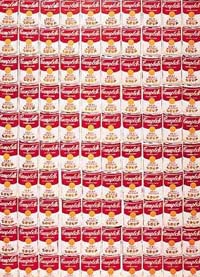|
Tah-Dah!
Coming soon to a
post office near you: an Andy Warhol postage stamp. Hail
to the patron saint of pap, whose art has all the spirit
of an engineering specification. He’s the sixth artist
to be commemorated on a stamp. The others are Louise Nevelson,
Frida Kahlo, Georgia O’Keeffe, Alexander Calder and Jackson
Pollock. Warhol is the questionable choice.
A 1964 self-portrait
from the Andy Warhol Museum in Pittsburgh is scheduled
for release sometime in 2002 with his signature wig and
bloodless complexion missing. But his face like stone
is there: the blank-television stare, along with the obstinate
mouth that never seems to have known a smile. I wouldn’t
ordinarily mention a person’s appearance, but Warhol’s
signals his art.
In the Biennial
2000 at the Pennsylvanian Academy of the Fine Arts, curator
Jonathan Binstock called Warhol "a passionate social
observer," not vacuous and superficial at all. Yeah,
right. It’s worth repeating here how this big cheese of
soup cans (he painted more than 100 of them) got his idea
to paint them—or rather how he got someone else’s idea
to paint them. Interior designer Muriel Latow deserves
the credit, provided you think that paintings of soup
cans over and over ad nauseum is deserving of any.
You can see Latow’s
part in the soup can paintings in Victor Bockris’ biography,
Warhol, published in London in 1989.
Warhol: "I’ve
got to do something that will have a lot of impact, that
will be different from Lichtenstein and Rosenquist (Pop
artists who hit it big before he did). I don’t know what
to do! Muriel, you’ve got fabulous ideas. Can’t you give
me an idea?"
Muriel: "What
do you like most in the whole world?"
Warhol: "I
don’t know. What do I like most in the whole world?"
Muriel: "You
should paint something that everybody sees every day,
that everybody recognizes, like a can of soup."
So he did, again
and again in mechanical reproduction with photographic
enlargements that he silkscreened onto canvas. This handy
Andy artist of slickness, of shallowness, made wallpaper
pattern reproductions of soup cans, and glorified their
banal sameness.
 |
| 100
Campbell's Soup Cans 1962 |
Which makes a second
piece of Warhol news more understandable than the one
about a commemorative stamp. The Warhol Foundation just
made a deal with the Beanstalk Group to license Warhol-brand
products, which include wallpaper. Perfect match, that.
Warhol equated his wallpaper-like soup can paintings with
Jackie Kennedy in bloodied pillbox hat. He made wallpaper-like
copies of her, too. And in the repetition, he numbed our
perception.
The Van Gogh Foundation
also has signed on for sweet deals, but unlike the Warhol
Foundation funny business, this one has nothing to do
with the artist or his art. Case in pointlessness: an
outdoor Vincent Village in Amsterdam, Holland full of
boutiques, where you can buy everything from perfumes
to a wine called Vincent Extra Brut Cava.
Gordon Gekko lives.
Remember him in the film Wall Street? He’s the
one who called art "just a capitalist illusion."
You might call Warhol the poster boy for the putdown.
Warhol said it himself
in the exhibit notes for his first retrospective show,
which was held in Stockholm in 1968: "If you want
to know all about Andy Warhol, just look at the surface
of my paintings... and there I am. There’s nothing behind
it."
This museless master
of the mundane, this impersonal, poker-faced pop artist
was our Chauncy Gardiner of Being There movie fame,
who liked to watch life, not live it, who was credited
with an intellect he didn’t have.
As I said, he doesn’t
deserve to be commemorated.
|